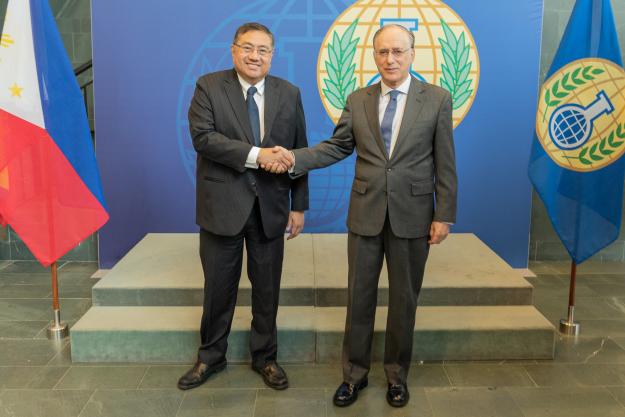
H.E. Mr Carlos Sorreta, Undersecretary for Multilateral and International Economic Relations, Department of Foreign Affairs, Republic of the Philippines, and H.E Ambassador Fernando Arias, Director-General of the Organisation for the Prohibition of Chemical Weapons (OPCW)
THE HAGUE, Netherlands—28 February 2023—The Director-General of the Organisation for the Prohibition of Chemical Weapons (OPCW), Ambassador Fernando Arias, met with Philippines’ Undersecretary for Foreign Affairs, H.E. Mr Carlos Sorreta, at the OPCW’s headquarters in the Hague.
The Director-General and Undersecretary Sorreta discussed a range of issues related to the implementation of the Chemical Weapons Convention (CWC), as well as international cooperation and capacity building activities aimed at strengthening chemical safety and security in Member States. The Director-General emphasised the essential role of the new OPCW Centre for Chemistry and Technology (ChemTech Centre) in advancing the Organisation’s work in these areas.
“The ChemTech Centre is a major investment that will help uphold the norm against chemical weapons,” the Director-General said. “Enhancing the capacity building for experts of the OPCW and its Member States is a key to better implement the Chemical Weapons Convention. The advanced training facility of the ChemTech Centre will strengthen national and regional emergency response capabilities against chemical incidents,” he added.
The Director-General briefed Undersecretary Sorreta on the preparation of the Fifth Review Conference, which will serve as fora for the assessment and evaluation of the Convention’s implementation and setting long-term priorities for the Organisation.
“The Philippines supports the OPCW’s programmes, services, and projects that foster the exchange of information, equipment, and chemicals consistent with the peaceful uses of chemistry which are beneficial to all mankind,” said Undersecretary Sorreta.
“The Philippines, in particular, is keen to pursue initiatives that can assist our country in strengthening its capabilities in countering chemical weapons threats,” he added.
Background
The Philippines have been an active member of the OPCW since the Chemical Weapons Convention entered into force in 1997.
As the implementing body for the Chemical Weapons Convention, the OPCW, with its 193 Member States, oversees the global endeavour to permanently eliminate chemical weapons. Since the Convention’s entry into force in 1997, it is the most successful disarmament treaty eliminating an entire class of weapons of mass destruction.
Over 99% of all declared chemical weapon stockpiles have been destroyed under OPCW verification. For its extensive efforts in eliminating chemical weapons, the OPCW received the 2013 Nobel Peace Prize.
